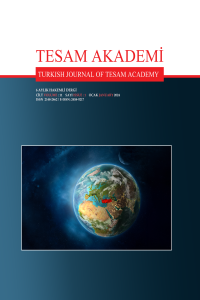Tesam Akademi Dergisi, TESAM Ekonomik, Siyasal ve Stratejik Araştırmalar Merkezi’nin siyaset bilimi, ekonomi, dış politika ve sosyoloji alanında orijinal ve özgün çalışmalarla hazırlayıp yılda 2 kez (Ocak-Temmuz) yayınladığı hakemli bir dergidir.
TESAM AKADEMİ Dergisi'nde makaleler Türkçe veya İngilizce olarak yayımlanabilmektedir. Türkçe makaleler için en az 750 kelimeden oluşan İngilizce geniş özet (summary) istenmektedir.
Derginin hedef kitlesini akademisyenler, araştırmacılar, profesyoneller, öğrenciler ve ilgili mesleki, akademik kurum ve kuruluşlar oluşturur.
Makale Kabul Tarihleri
Temmuz tarihli sayı için 1 Ocak - 15 Nisan; Ocak tarihli sayı için 1 Temmuz - 15 Ekim). Bu tarihler dışındaki makale başvurularını TESAM Akademi Hakemli Dergisi editöryal ekibi tarafından kabul edilmemektedir.
İşlemleme Ücreti Alınma
Derginin tüm giderleri TESAM Ekonomik Siyasal ve Stratejik Araştırmalar Merkezi tarafından karşılanmaktadır. Dergide makale yayını ve makale süreçlerinin yürütülmesi ücrete tabi değildir. Dergiye gönderilen ya da yayın için kabul edilen makaleler için işlemleme ücreti ya da gönderim ücreti alınmaz.Açık Erişim İlkesi
TESAM AKADEMİ Hakemli Dergisi, tüm içeriği okura ya da okurun dahil olduğu kuruma ücretsiz olarak sunulur. Okurlar, ticari amaç haricinde, yayıncı ya da yazardan izin almadan dergi makalelerinin tam metnini okuyabilir, indirebilir, kopyalayabilir, arayabilir ve link sağlayabilir.TESAM AKADEMİ makaleleri açık erişimlidir ve Creative Commons Atıf-GayrıTicari 4.0 Uluslararası (CC BY-NC 4.0) (https://creativecommons.org/licenses/by-nc/4.0/deed.tr ) olarak lisanslıdır.
Detaylı bilgi için tesamakademi@gmail.com ADRESİNDEN EDİTÖR İLE İLETİŞİME GEÇEBİLİRSİNİZ.
2024 - Cilt: 11 Sayı: 1
Araştırma Makalesi
Comparison of Corporate Sustainable Performance of Deposit Money Banks with Entropy-Topsis Method

